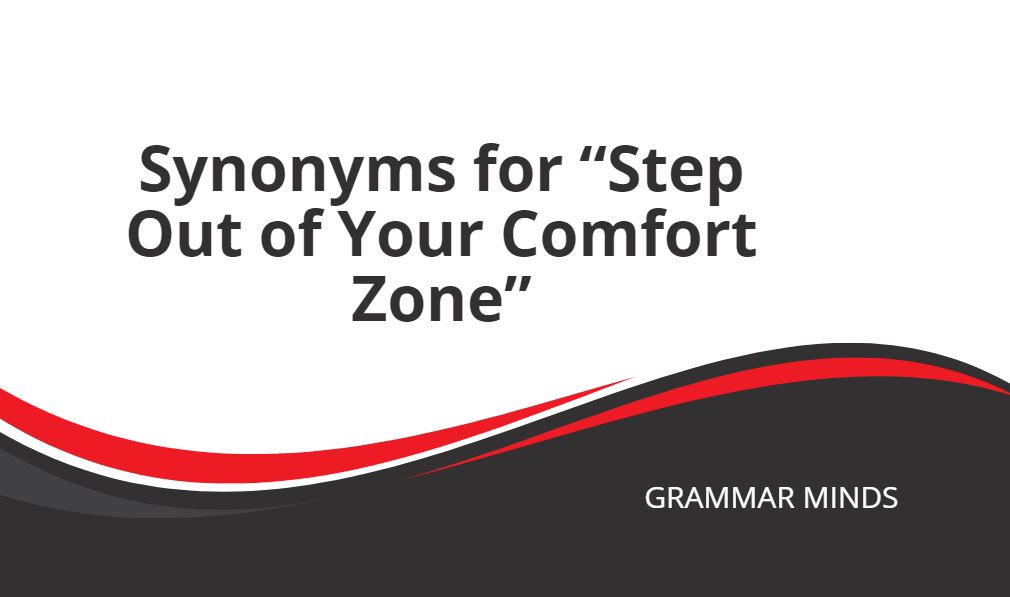
You’re trying to describe someone who steps out of their comfort zone, right? Well, there are some other phrases you can use for stepping out of your comfort zone that might help.
This article will look at some alternative phrases you can use to present someone as a person willing to take risks and try new things.
Step Out of Your Comfort Zone Synonyms
- Take a leap of faith
- Push your boundaries
- Venture into the unknown
- Embrace new challenges
- Expand your horizons
- Try something new
- Challenge yourself
- Dare to be different
- Break your routine
- Explore new territory
- Step into the unknown
- Take on new challenges
- Move beyond your limits
- Get out of your safe space
- Face your fears
KEY POINTS
- “Step out of your comfort zone” is great in many formal and informal situations to encourage risk-taking and growth.
- You could try “take a leap of faith” in formal contexts as a good synonym.
- “Push your boundaries” is a great informal alternative that works in many contexts.
Keep reading to learn more about the contexts you can use these synonyms in. Most of it will relate to personal development, but we’ve also explored how to use them more conversationally.
Also, you can skip to the last section to find out whether “step out of your comfort zone” is correct. If you’ve come to learn about that, then you can skip ahead straight away.
Take a Leap of Faith (Formal)
“Take a leap of faith” is a great formal metaphor demonstrating another way to say “step out of your comfort zone.” It’s a professional synonym that shows someone’s willingness to take risks and embrace uncertainty.
The phrase mainly works in motivational speeches or professional development contexts. It lets others know that you’re encouraging bold actions and confident decisions.
You can also use “take a leap of faith” when addressing employees or colleagues. It is a form of encouragement, showing that they need to trust their instincts and take bold steps.
“Take a leap of faith” is a great formal alternative, allowing you to use it instead of “step out of your comfort zone.” Both are effective formally, so you can switch between them when you want to keep your language engaging.
Here is a motivational example to help you understand it:
Sometimes, you just need to take a leap of faith to achieve your dreams.
And here is a conversational example:
I know it’s scary, but you should take a leap of faith. You might surprise yourself.
Push Your Boundaries (Informal)
“Push your boundaries” is a great informal synonym for “step out of your comfort zone.” It’s much more conversational, allowing you to use it in less strict contexts.
The casual tone works well when encouraging friends or family to try new things. It shows you’re supportive of their growth and development.
You could also use it to motivate colleagues or teammates to go beyond their usual limits. It shows that you believe in their potential to achieve more.
“Push your boundaries” doesn’t work very well formally, though. You should stick with “step out of your comfort zone” in formal contexts (like professional development workshops) if you want to be professional.
Here are a few examples that should give you more information:
You’ll never know what you’re capable of if you don’t push your boundaries.
Come on, push your boundaries a bit. It’ll be fun, and you’ll learn something new.
Is It Correct to Say “Step Out of Your Comfort Zone”?
“Step out of your comfort zone” is correct and useful in many situations. It’s good for both formal and informal situations.
Also, you can use it for yourself or someone else. It’s a good way to encourage personal growth and risk-taking. Or, you can use it to describe someone who is brave enough to try new things.
Here is another variation you can use:
Leave your comfort zone You might find a hyphen between the words “step out of your comfort zone,” but only in rare circumstances. Generally, you would only hyphenate the phrase when it’s acting as a compound adjective.
For instance:
She’s a step-out-of-your-comfort-zone kind of person. Here, all the words in the phrase modify “person.” Therefore, a hyphen is necessary between each word.
Don’t forget to bookmark this page if you want to come back to our synonyms. That way, you’ll always have something different to say instead of “step out of your comfort zone.”






